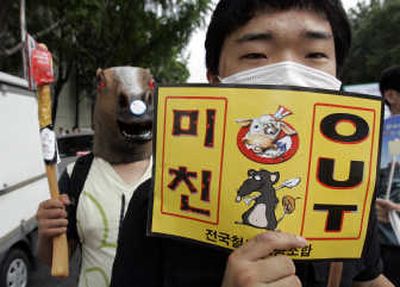South Korea OKs U.S. beef imports

SEOUL, South Korea – South Korea said it will resume imports of U.S. beef after American and South Korean suppliers agreed to block meat from older cattle, aiming Saturday to soothe health concerns that sparked weeks of demonstrations against new President Lee Myung-bak.
Still, protest leaders argued the plan doesn’t go far enough and staged the latest of their daily candlelight rallies. The rally caused the main intersection in downtown Seoul to be blocked as thousands of riot police prevented demonstrators from marching to the presidential Blue House.
Procedures to put the import agreement into effect were to start Monday, Trade Minister Kim Jong-hoon said, but it was not clear when American beef would reach South Korean markets.
Lee, a pro-U.S. conservative who took office in February, had agreed to allow resumed American beef imports in April – seeking to improve relations with Washington and pave the way for a larger free-trade deal between the two countries to help reinvigorate the South Korean economy.
The beef-loving South has allowed intermittent U.S. beef imports since banning it in 2003 after the first case of mad cow disease was discovered there.
The April agreement had few restrictions on what meat would be allowed, sparking protests against Lee for caving in to American demands and failing to consider public opinion about health risks. In the wake of demonstrations that grew as large as 80,000 people, Lee replaced all his top advisers and his entire Cabinet also has offered to resign.
The U.S. government had refused to renegotiate the April deal, worried it would set a precedent for other countries to back out of trade agreements.
Instead, U.S. Trade Representative Susan Schwab said the new arrangement – agreed to after talks last week with her South Korean counterpart – was a “commercial understanding” between U.S. exporters and South Korean importers that only meat from cattle younger than 30 months would be shipped, believed to be less at risk for mad cow disease.
The U.S. Department of Agriculture will set up a “voluntary” system to verify the age of beef, Schwab said. If South Korea finds beef has been shipped that violates the agreement, it can take action only against the specific product or company involved.
“The age verification system will be in place until concerns over safety of U.S. beef subside,” South Korean Trade Minister Kim told reporters in Seoul. He said South Korea will have the right to inspect U.S. slaughterhouses and will not import parts of cattle such as brains, eyes, skulls and spinal cords that can carry mad cow disease.